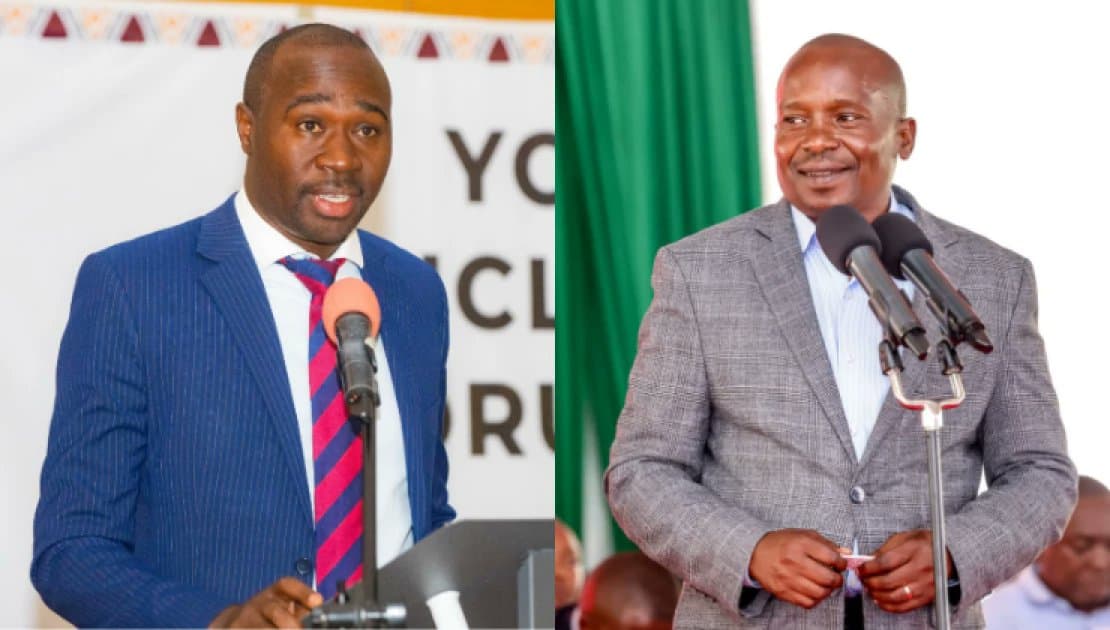We're loading the full news article for you. This includes the article content, images, author information, and related articles.
A Kenyan Member of Parliament has publicly accused Deputy President Kithure Kindiki of protecting powerful cartels involved in the deadly illicit alcohol trade, raising serious questions about political interference in the fight against dangerous brews that claim lives across the country.

Manyatta Member of Parliament Gitonga Mukunji has publicly accused Deputy President Kithure Kindiki of protecting influential second-generation alcohol manufacturers, alleging that the Deputy President's office has become a sanctuary for these brewers. Speaking on Tuesday, October 14, 2025, in Kiruari village, Embu North, Mukunji claimed that the national effort against illicit brews faltered following the impeachment of former Deputy President Rigathi Gachagua.
"The fight against alcoholism and drugs died the day Rigathi Gachagua left office. The current Deputy President is not only silent, he's part of the problem. Some of these brewers are his proxies," Mukunji stated. He further alleged that individuals behind the production of toxic brews remain 'untouchable' due to political protection, allowing their businesses to proliferate while young Kenyans continue to die.
The illicit alcohol trade has been a persistent challenge in Kenya for over a century, with roots tracing back to the colonial era when restrictions on traditional brews led to the emergence of underground production. Various legislations, including the Alcoholic Drinks Control Act of 2010 (often referred to as the Mututho Law), have been enacted to curb the menace, but illicit alcohol continues to thrive.
In recent years, the government has intensified crackdowns. In February 2024, Interior Cabinet Secretary Kithure Kindiki declared illicit liquor, narcotic drugs, and psychotropic substances a significant national security threat, equating perpetrators to terrorists and bandits. He warned that complacent security agents and administrators would face immediate dismissal and prosecution. In March 2024, Kindiki announced the closure of over 14,000 alcoholic premises, including 4,800 operating near schools, and the destruction of 12 distilleries.
However, the fight against illicit alcohol has also been marked by political dynamics. In August 2025, Interior Cabinet Secretary Kipchumba Murkomen announced a 100-day Rapid Results Initiative (RRI) targeting illicit alcohol, expressing concern that some senior government officials, police officers, and politicians were implicated in the trade. Murkomen, who took over the Interior docket from Kindiki in December 2024, pledged to hold all individuals accountable regardless of rank.
Kenya has a robust legal and regulatory framework to control alcohol and substance abuse, including the Alcoholic Drinks Control Act, 2010. Despite this, enforcement remains a significant challenge, often hampered by corruption among law enforcement officers, weak criminal justice systems, and porous borders facilitating smuggling.
Recent policy proposals, backed by Interior Cabinet Secretary Kipchumba Murkomen, aim to further tighten regulations. These include raising the legal drinking age from 18 to 21, banning alcohol sales in supermarkets and on public transport, and prohibiting consumption in public spaces like beaches and parks. The Kenya Bureau of Standards (KEBS) is also reviewing guidelines to increase the minimum quantity of alcoholic drinks from 250ml to 750ml or higher to enforce compliance.
The Alcoholic Beverages Association of Kenya (ABAK) and the Bar, Hotel and Liquor Traders Association (BAHLITA) have consistently called for stakeholder involvement in policy formulation, arguing that a collaborative approach is crucial to sealing loopholes in the sector. They have also highlighted that high excise taxes on legal alcohol, coupled with reduced consumer spending power, often drive consumers towards cheaper, illicit alternatives.
The human cost of illicit alcohol is stark. In February 2024, at least 13 people died and more than 10 were blinded in Kirinyaga County after consuming illicit liquor. Survivors reported blurred vision, blindness, and confusion. The National Authority for the Campaign Against Alcohol and Drug Abuse (NACADA) has repeatedly cautioned the public about the rising cases of illicit alcohol-related deaths and illnesses.
The proliferation of illicit alcohol poses severe public health risks, including poisoning, disability, and death, often due to contamination with dangerous chemicals like methanol. Beyond the immediate health crisis, the trade undermines national security, erodes the country's investment profile, and leads to significant tax revenue losses for the government.
Economically, the illicit alcohol market thrives on its affordability, often costing less than half the price of legitimate beverages, making it attractive to low-income consumers and youth. This creates unfair competition for legitimate businesses and discourages investment in the formal alcohol sector.
While industry-funded studies provide valuable data, some critics argue that they may sometimes serve to shift blame and divert attention from other policy solutions, such as effective alcohol taxation. There is also ongoing debate about the effectiveness of stringent laws, with some stakeholders warning that overly zealous regulations could inadvertently drive more of the alcohol trade underground.
The allegations of political protection for illicit alcohol cartels, as raised by MP Gitonga Mukunji, highlight a critical area of uncertainty and controversy. Such claims, if substantiated, would point to deep-seated corruption and a significant impediment to eradicating the deadly trade.
The ongoing 100-day Rapid Results Initiative by the Ministry of Interior and National Administration will be a key indicator of the government's commitment to tackling illicit alcohol. The response to MP Mukunji's allegations against Deputy President Kindiki will also be crucial in demonstrating accountability and transparency within government. Furthermore, the implementation and impact of proposed new alcohol control policies, particularly those related to age limits and sales restrictions, will be closely watched by both public health advocates and industry stakeholders.
Keep the conversation in one place—threads here stay linked to the story and in the forums.
Sign in to start a discussion
Start a conversation about this story and keep it linked here.
Other hot threads
E-sports and Gaming Community in Kenya
Active 9 months ago
The Role of Technology in Modern Agriculture (AgriTech)
Active 9 months ago
Popular Recreational Activities Across Counties
Active 9 months ago
Investing in Youth Sports Development Programs
Active 9 months ago
Key figures and persons of interest featured in this article